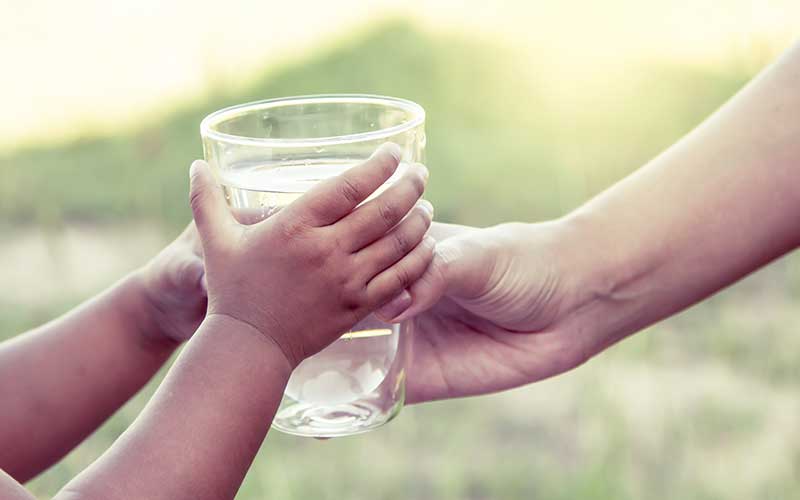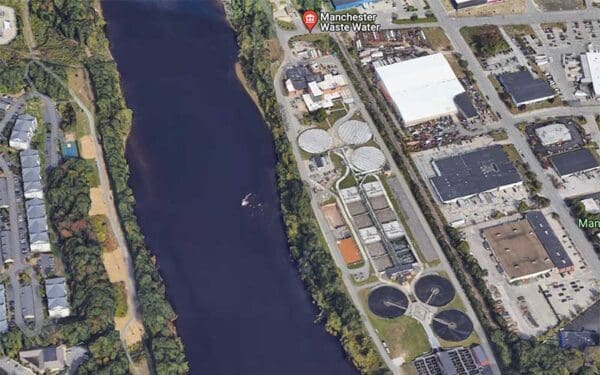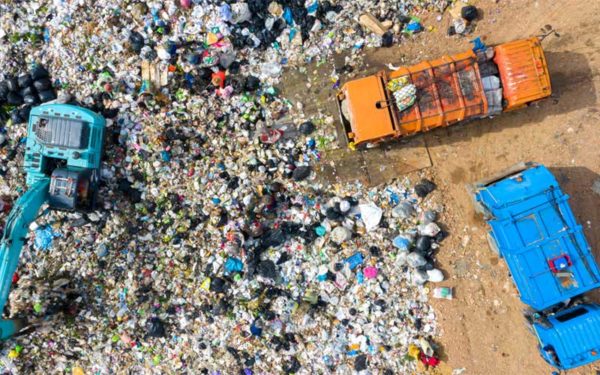
We should be able to trust that our drinking water is safe, but the Department of Health has failed to take urgent action to protect us from PFAS chemicals. Photo: Shutterstock
Across New England, thanks in large part to a push by CLF and our partners, states are taking action to protect people from a class of toxic chemicals called PFAS. These chemicals pose a serious risk to public health, even in very small concentrations. To date, they have been linked to several cancers, problems with fertility and pregnancy, compromised immune systems, and interference with natural hormones and with liver, thyroid, and pancreatic function.
Here in Rhode Island, however, the Department of Health has so far failed to take meaningful and timely action to address this threat. It has not only denied a petition to set a drinking water standard filed by CLF and Toxics Action Center but also testified against legislation that would require it to protect us from these chemicals. And, while it is currently deciding how to regulate PFAS, it is doing so behind closed doors in secret meetings that are open to industry representatives but not to the public.
In light of the Department of Health’s slow response to this public health crisis, Representative June Speakman and Senator Erin Lynch Prata have stepped up by championing a bill that would address toxic PFAS chemicals in our drinking water, groundwater, and surface waters. CLF supports this bill, and we urge you to contact your legislators and tell them that it’s past time to take action to keep us safe from these “forever chemicals.”
The Department of Health is Relying on an Unsafe Standard for Too Few PFAS Chemicals
States have the responsibility under the federal Safe Drinking Water Act to make sure that the water coming out of our taps is safe to drink. Here in Rhode Island, that responsibility falls on the Department of Health. That means setting limits on the level of chemicals and other substances allowed in our drinking water before they become harmful to our health. While the agency is testing some drinking water systems for PFAS and holding the secret meetings mentioned above, it so far has denied our petition to set a drinking water standard and refused to begin the public process of establishing a regulation to protect public health.
PFAS is a class of thousands of related chemical compounds. They are often referred to as “forever chemicals” because they persist in our environment and our bloodstreams for decades. As of this writing, the Department of Health is only requiring folks to stop drinking water if two PFAS compounds, PFOA and PFOS, are found in levels above 70 parts per trillion.
Regulating only two compounds out of upwards of 4,000 – two that have been phased out of production, by the way – and using such a high level as a trigger for action does not keep us safe. In fact, it puts us all at great risk. A Harvard University study has suggested that a safe level of PFAS is closer to only 1 part per trillion. For context, experts liken 1 part per trillion to a drop of water in an Olympic-sized swimming pool.
Other states are setting stricter standards. For example, Massachusetts has proposed a limit of 20 parts per trillion combined for six of the most common and well-understood PFAS compounds. Vermont has already set a limit of 20 parts per trillion combined for five PFAS compounds. Other states, including New Hampshire, New York, New Jersey, and Michigan, have set standards for individual compounds at levels well below 20 parts per trillion.
The Department of Health’s out-of-date 70 parts per trillion limit for PFOA and PFOS means that even the systems that do get tested are not necessarily providing safe drinking water to Rhode Islanders. If testing reveals these two toxic chemicals are present, but at levels below the Health Department’s unsafe limit – or if other PFAS compounds are discovered, no matter how high the level of contamination – residents are not notified. Instead, they are left to blindly continue drinking contaminated water, risking their health in the process.
Forever Chemicals Have Been Found All over Rhode Island
PFAS chemicals have been detected in drinking water, groundwater, and surface waters throughout Rhode Island. Drinking water systems serving 14 of our cities and towns – including Coventry, Middletown, Cumberland, Exeter, Newport, Burrillville, Pawtucket, South Kingstown, Westerly, and North Providence – have tested positive for PFAS at levels already declared unsafe in neighboring states. What’s more, in Foster, North Smithfield, Scituate, and Glocester, these elevated levels have been detected in school water systems.
Other towns like Warwick and North Kingstown have experienced groundwater contamination that luckily did not affect drinking water. Despite this abundant evidence of the problem, however, tens of thousands of Rhode Islanders still drink water from systems that so far haven’t been tested for PFAS at all.
PFAS Chemicals Are in Bottled Water, Carpets, and Chocolate Cake, Too…
The real issue is that PFAS are everywhere. They can be found in everyday products, including nonstick cookware, water-repellent clothing, stain-resistant fabrics and carpets, firefighting foam, and food packaging.
Last year New Hampshire regulators found that bottled water sourced in Massachusetts and sold throughout New England under brand names such as Ice Canyon and 365 Spring Water contained unsafe levels of PFAS. Lowes and Home Depot have each recently announced that they will stop selling carpets that use PFAS to repel stains. The chemicals have even been discovered at unsafe levels in chocolate cake sold in our grocery stores.
PFAS are pervasive, and they take a very long time to break down, so it’s no surprise that they make their way into our soil, our air, and our water – and into our bloodstreams.
Given our widespread exposure to these toxic chemicals, it’s critical that the Health Department takes seriously its responsibility to provide safe, clean water and make sure we’re not drinking PFAS.
Take Action
CLF is working regionwide to tackle toxic chemicals in our drinking water. We want state leaders to require regular monitoring for and removal of PFAS chemicals from our waters. A bill currently under consideration by the General Assembly would force overdue action here in Rhode Island to address this public health threat. Among other critical provisions, the bill would:
- set a drinking water standard of 20 parts per trillion for six PFAS compounds, matching the protection proposed in Massachusetts;
- require the Department of Health to explore the regulation of all PFAS compounds as a class;
- set standards for PFAS in groundwater and surface waters; and
- require state agencies to investigate potential sources of PFAS contamination.
Contact your legislators to let them know that it’s time to take action on toxic PFAS chemicals so that Rhode Islanders don’t have to worry about what’s in our water. Tell them you want them to support H-7216 and S-2235.




